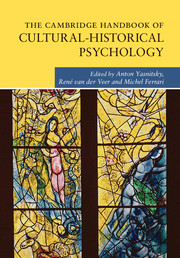Crossref Citations
This Book has been
cited by the following publications. This list is generated based on data provided by Crossref.
Métraux, Alexandre
2015.
Lev Vygotsky as seen by someone who acted as a go-between between eastern and western Europe.
History of the Human Sciences,
Vol. 28,
Issue. 2,
p.
154.
Jovanović, Gordana
2015.
Vicissitudes of history in Vygotsky’s cultural-historical theory.
History of the Human Sciences,
Vol. 28,
Issue. 2,
p.
10.
Солдатова, Галина
and
Шайгерова, Людмила
2015.
Рефлексия множественности выбора в психологии межкультурных коммуникаций.
Психологические исследования,
Vol. 8,
Issue. 40,
Fraser, Jennifer
and
Yasnitsky, Anton
2015.
Deconstructing Vygotsky’s victimization narrative.
History of the Human Sciences,
Vol. 28,
Issue. 2,
p.
128.
Bogolyubova, Olga
Upravitelev, Philipp
Churilova, Anastasia
and
Ledovaya, Yanina
2018.
Expression of Psychological Distress on Instagram Using Hashtags in Russian and English: A Comparative Analysis.
Sage Open,
Vol. 8,
Issue. 4,
van der Veer, René
and
Zavershneva, Ekaterina
2018.
The final chapter of Vygotsky's Thinking and Speech: A reader's guide.
Journal of the History of the Behavioral Sciences,
Vol. 54,
Issue. 2,
p.
101.
Ferrari, Michel
and
Alhosseini, Fatemeh
2019.
The Cambridge Handbook of Wisdom.
p.
409.
Chaves-Castaño, Liliana
Piñeres-Sus, Juan David
Olarte Rodríguez, Jose Luis
and
Runge Peña, Andrés Klaus
2020.
La necesidad de una posición crítica en la investigación psicológica. Apuntes sobre teoría y experiencia.
CES Psicología,
Vol. 13,
Issue. 2,
p.
166.
Rodríguez Arocho, Wanda C.
2021.
Latin American Advances in Subjectivity and Development.
p.
171.
Taype-Huarca, Luis Alberto
and
Fernández-González, Svieta Valia
2021.
Latin American Advances in Subjectivity and Development.
p.
211.
2021.
The Cambridge Handbook of Identity.
p.
99.
Bertau, Marie-Cécile
2021.
The Cambridge Handbook of Identity.
p.
172.
Sève, Lucien
2021.
Where is Marx in the work and thought of Vygotsky?.
Mind, Culture, and Activity,
Vol. 28,
Issue. 4,
p.
293.
Akhutina, T.V.
2021.
On Revisionism in Vygotskian Science. Commentary on «In August of 1941» by Yasnitsky and Lamdan (2017).
Cultural-Historical Psychology,
Vol. 17,
Issue. 3,
p.
152.
Ostroverkh, O.S.
2022.
Learning Space as a Prerequisite of Agency in Learning Activity.
Psychological Science and Education,
Vol. 27,
Issue. 3,
p.
16.
Asmolov, Alexander G.
2022.
The Historical Meaning of the Crisis of Cultural Activity Psychology.
Journal of Russian & East European Psychology,
Vol. 59,
Issue. 1-3,
p.
5.
Hutmacher, Fabian
2022.
Gerd Jüttemann’s “historical psychology”: Why it should have succeeded, why it was ignored, and what that means for the future.
Theory & Psychology,
Vol. 32,
Issue. 6,
p.
868.
Rosso, Mattia
Greige, Tatiana
Palmer, Charles
Peng, Greta Solinap
Ardakani, Rumyar V.
Frolov, Alexander
George, Manju
Carandang, Raphael Arellano
Gheihman, Galina
and
Stanley, Michael P.H.
2024.
Education Research: The Neurohumanities in Training.
Neurology Education,
Vol. 3,
Issue. 4,
Norrie, Christopher S.
Deckers, Stijn R. J. M.
Radstaake, Maartje
and
van Balkom, Hans
2024.
A Narrative Review of the Sociotechnical Landscape and Potential of Computer-Assisted Dynamic Assessment for Children with Communication Support Needs.
Multimodal Technologies and Interaction,
Vol. 8,
Issue. 5,
p.
38.
Kölbl, Carlos
2024.
Cultural Psychology.
p.
15.



